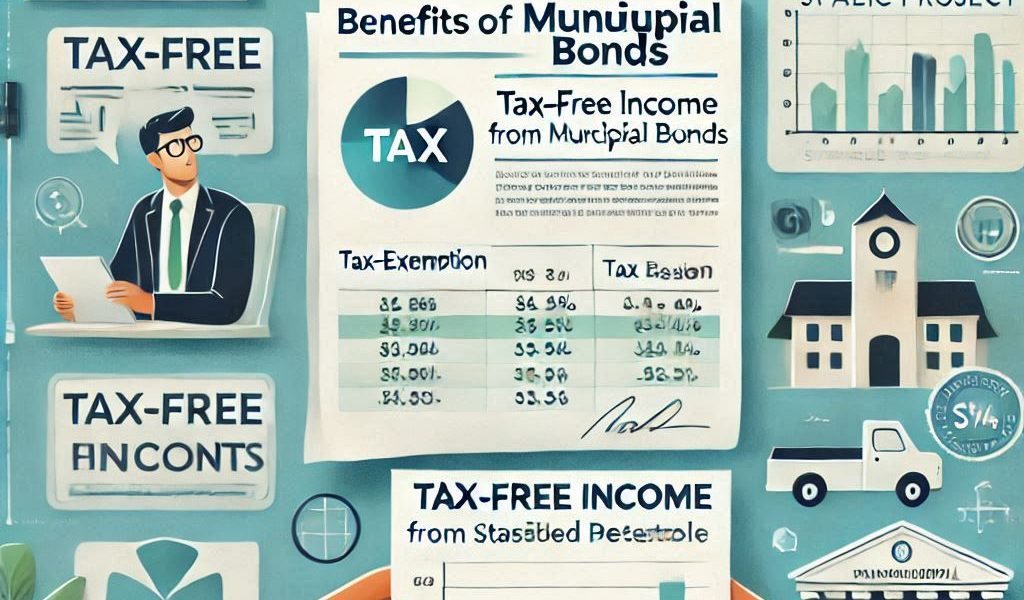Introduction
For tax-savvy investors, municipal bonds present an attractive investment opportunity. These bonds, issued by local government entities such as states, cities, or counties, offer several benefits that make them appealing to individuals looking to optimize their tax situation while earning steady returns.
In this blog, we will explore the key benefits of municipal bonds and why they are particularly beneficial for investors who are conscious of taxes. Whether you’re new to municipal bonds or looking to diversify your portfolio with tax-efficient investments, this guide will provide valuable insights into why municipal bonds might be the right choice for you.
What Are Municipal Bonds?
Municipal bonds, often referred to as “munis,” are debt securities issued by state and local governments or their agencies to finance public projects such as infrastructure development, education, or transportation. When you invest in municipal bonds, you are lending money to the government in exchange for periodic interest payments (also known as coupons) and the return of your principal when the bond matures.
Municipal bonds are typically classified into two types:
- General Obligation Bonds (GO Bonds): These bonds are backed by the full faith and credit of the issuing government, meaning they are repaid using the government’s general revenue sources, such as taxes.
- Revenue Bonds: These bonds are backed by the revenue generated from specific projects or services, such as tolls from a highway or fees from a public utility.
Why Municipal Bonds Are Attractive to Tax-Savvy Investors
1. Tax-Exempt Interest Income
The most significant advantage of municipal bonds is their tax-exempt status. The interest income from municipal bonds is generally exempt from federal income taxes, making them especially attractive for high-income earners or investors in higher tax brackets. This can result in substantial tax savings over time.
- Federal Tax Exemption: Municipal bond interest is usually exempt from federal taxes, allowing you to keep more of your earnings.
- State and Local Tax Exemption: In some cases, municipal bonds are also exempt from state and local taxes if you live in the state where the bond was issued. This can be a significant advantage for residents of high-tax states.
For investors seeking to maximize after-tax income, municipal bonds offer a tax-efficient alternative to taxable bonds or other investments that generate taxable income.
2. Higher After-Tax Yields
Because municipal bond interest is exempt from federal taxes, taxable-equivalent yields become an essential factor to consider when evaluating municipal bonds. A taxable-equivalent yield is the yield a taxable bond would need to offer to match the after-tax yield of a municipal bond. The formula for calculating the taxable-equivalent yield is:Taxable-equivalent yield=Municipal bond yield1−Tax rate\text{Taxable-equivalent yield} = \frac{\text{Municipal bond yield}}{1 – \text{Tax rate}}Taxable-equivalent yield=1−Tax rateMunicipal bond yield
For example, if you’re in the 35% federal tax bracket and a municipal bond offers a 4% yield, the taxable-equivalent yield would be:4%1−0.35=6.15%\frac{4\%}{1 – 0.35} = 6.15\%1−0.354%=6.15%
This means that for a taxable bond to provide the same after-tax return as the 4% municipal bond, it would need to yield 6.15%.
For high-income investors, this can make municipal bonds a much more attractive option than taxable bonds or other investment vehicles, as they provide a higher effective yield after taxes.
3. Diversification of Tax-Advantaged Investments
Municipal bonds can help diversify your portfolio of tax-advantaged investments. When you rely on taxable bonds, stocks, or other taxable income sources, much of your return is eroded by taxes. Municipal bonds provide a way to balance your portfolio and minimize your overall tax liability.
By holding a portion of your portfolio in tax-exempt municipal bonds, you can enhance your overall returns while reducing the amount you pay in taxes. This is particularly beneficial if you already have a significant exposure to taxable investments such as equities or corporate bonds.
4. Lower Risk and Stability
Municipal bonds, particularly those from strong, financially stable issuers, tend to be lower risk than other types of bonds. While they are not risk-free, the default rate on municipal bonds is historically lower than that of corporate bonds. The issuers, which are local governments, often have taxing power and revenue sources that provide a relatively stable source of income.
Additionally, municipal bonds can be an attractive option for conservative investors looking for stability and reliability in their fixed-income investments. Investors in higher tax brackets who are risk-averse will often find municipal bonds a safer alternative to taxable corporate bonds.
5. Social Responsibility Investing (SRI) Opportunities
Municipal bonds are frequently issued to fund projects that contribute to the public good. For example, bonds may be issued to finance schools, hospitals, public transportation systems, and renewable energy initiatives. As such, municipal bonds provide an opportunity for investors to support socially responsible initiatives while earning a return on their investment.
For those interested in social responsibility investing, municipal bonds can be an excellent choice, allowing you to align your financial goals with your values.
6. State-Specific Tax Benefits
For residents of certain states, investing in municipal bonds issued by their state or local government can result in additional state income tax exemptions. This can significantly increase the tax savings for state residents who invest in bonds issued within their jurisdiction. Many states, such as California, New York, and Texas, offer attractive tax incentives for local bondholders.
This additional state tax exemption provides further benefit to tax-savvy investors and makes investing in in-state municipal bonds even more appealing.
7. Predictable Income Stream
Municipal bonds provide a predictable and stable income stream, as they generally pay interest semi-annually. This regular income stream can be especially valuable for retirees or those seeking consistent cash flow. The stability of municipal bonds adds a level of comfort, especially when considering tax-free income over the long term.
Factors to Consider Before Investing in Municipal Bonds
While municipal bonds provide several advantages, they are not without risks. Here are a few things to consider before investing:
- Credit Risk: Not all municipal bonds are created equal. Some issuers may have financial difficulties that could impact their ability to repay bondholders. Look for bonds with higher credit ratings from agencies like Moody’s, S&P, or Fitch.
- Interest Rate Risk: Like all bonds, municipal bonds are sensitive to interest rate changes. When interest rates rise, bond prices tend to fall. This could impact your return if you need to sell your bonds before maturity.
- Liquidity: Municipal bonds can be less liquid than other investments, such as stocks. It may be harder to sell them quickly without incurring a loss, depending on market conditions.
Conclusion
Municipal bonds offer significant tax advantages, particularly for high-income earners looking to optimize their tax situation. With their tax-exempt interest income, higher after-tax yields, and lower risk, municipal bonds are a valuable addition to a tax-savvy investor’s portfolio. Whether you’re seeking stability, tax-free income, or diversification, municipal bonds provide a way to balance both financial goals and tax planning strategies.
As with any investment, it’s important to assess your risk tolerance, financial goals, and tax situation before diving in. However, for those in higher tax brackets, municipal bonds can be a powerful tool for growing wealth while minimizing taxes.



